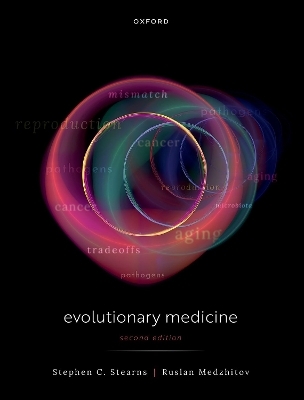
Evolutionary Medicine
Oxford University Press (Verlag)
978-0-19-287197-8 (ISBN)
Evolutionary thinking provides insights into many different areas in the research and practice of medicine and public health. It takes specialties such as medical microbiology, epidemiology, oncology, gynecology, and psychiatry that had become increasingly siloed and places them in a larger framework. This foundational structure enables students to view medical knowledge as an integrated whole, underpinned by general principles rather than a loose collection of disparate facts. The discipline of evolutionary medicine continues to advance rapidly as new results come in showing where the insights pay off and where they do not. Its conceptual foundations have also been strengthened in papers not yet reflected in the textbooks, so a new edition is therefore timely. At the same time, the teaching of evolutionary medicine has also been steadily gaining momentum both in courses that prepare undergraduates for medical school in North America and in other contexts worldwide.
Evolutionary Medicine is intended for undergraduate students preparing for careers in medicine and public health, students in schools of medicine and public health, and medical professionals curious about the insights that evolutionary thinking can bring to their field. It will also be relevant to students and researchers in the fields of evolutionary biology, anthropology, developmental biology, and genetics. It highlights the most important insights in a relatively brief and compelling book that does not attempt encyclopedic coverage of a rapidly changing field.
Stephen C. Stearns is the Edward P Bass Professor of Ecology and Evolutionary Biology at Yale University. His previous books include The Evolution of Life Histories (1992), Evolution: An Introduction 2e (2005), and Evolution in Health and Disease 2e (2007), all published by OUP. A founder of the European Society for Evolutionary Biology (and its journal) as well as the Tropical Biology Association, Stearns has served as President of both. He is a Fellow of the American Academy for Arts and Sciences (1987) and a Distinguished Fellow of the European Society for Evolutionary Biology (2007). He was awarded the Devane Medal for undergraduate teaching (2011) and the Harwood F. Byrnes/Richard B. Sewall Teaching Prize (2021). Ruslan Medzhitov is the David W. Wallace Professor of Immunobiology at Yale University School of Medicine. He is also an Investigator with the Howard Hughes Medical Institute. He is a member of the National Academy of Sciences, a Fellow of the American Academy of Microbiology, and a member of the Institute of Medicine of the National Academy of Sciences. His research interests include inflammation and inflammatory diseases, allergy, infection and immunity, and evolutionary medicine.
1: Evolutionary thinking
2: Mismatch, the transition to modernity, and the diseases of civilization
3: A system perspective on health and disease
4: Tradeoffs
5: What is an ill person?
6: What is a disease?
7: Defenses
8: Aging
9: Pathogens I: Diversity, lifecycles, genetics, and emergence
10: Pathogens II: Evasion, suppression, virulence, and resistance
11: The microbiota in health and disease
12: Cancer
13: Reproductive medicine
14: Mental disorders
15: Applying evolutionary thinking in the clinic
16: Applying evolutionary thinking to public health
| Erscheinungsdatum | 23.08.2024 |
|---|---|
| Verlagsort | Oxford |
| Sprache | englisch |
| Maße | 193 x 250 mm |
| Gewicht | 1020 g |
| Themenwelt | Studium ► Querschnittsbereiche ► Geschichte / Ethik der Medizin |
| Naturwissenschaften ► Biologie ► Evolution | |
| ISBN-10 | 0-19-287197-8 / 0192871978 |
| ISBN-13 | 978-0-19-287197-8 / 9780192871978 |
| Zustand | Neuware |
| Informationen gemäß Produktsicherheitsverordnung (GPSR) | |
| Haben Sie eine Frage zum Produkt? |
aus dem Bereich


